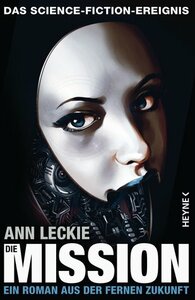Take a photo of a barcode or cover
adventurous
challenging
dark
emotional
mysterious
reflective
sad
tense
slow-paced
Plot or Character Driven:
A mix
Strong character development:
Yes
Loveable characters:
Yes
Diverse cast of characters:
Yes
Flaws of characters a main focus:
Yes
You know, I wasn't sure how one would handle this trilogy--the setups and checks filled out by Ancillary Justice were huge, and for the most part, they cashed out in that same book. So what does the middle part of a trilogy really lift except all the gravity of the third? Good news--this book isn't really interested in that. This is a very deliberate and very intimate character study of state class warfare, a careful dismantling of colonial ideology, and an espionage tale that uses all of the science fiction stuff we've come to love from Justice in new, fascinating, and deeply sad ways. I would have never guessed that we would take an entire book to go in this direction, but I have also never been more glad for it.
I do think that some of the writing is not as sharp or efficient as in Justice, and Leckie uses some dialogue tags that got very tiresome by the end. This is also a much slower, and geographically confined book than its predecessor, so I don't rate it *quite* as highly even though I do still consider this a very qualified entry in one of the greatest space operas I've ever come across.
I do think that some of the writing is not as sharp or efficient as in Justice, and Leckie uses some dialogue tags that got very tiresome by the end. This is also a much slower, and geographically confined book than its predecessor, so I don't rate it *quite* as highly even though I do still consider this a very qualified entry in one of the greatest space operas I've ever come across.
adventurous
challenging
emotional
hopeful
inspiring
reflective
medium-paced
Plot or Character Driven:
A mix
Strong character development:
Yes
Loveable characters:
Yes
Diverse cast of characters:
Yes
Flaws of characters a main focus:
Complicated
The setting of the first book stretches over thousands of years, across multiple star systems, includes characters from the whole socio political spectrum and ends with the beginning of a civil war at the highest level of the command structure . This book continues immediately from the first book, but the setting quickly shrinks down to one location. The civil war has become only a menacing presence in the background while the characters maneuver for local political advantages while drinking tea. There are lots of tea drinking and lots of discussion of tea ware and social decorum. I was not expecting this big change of pace from the first book and it took me a while to settle into it. Once I understood the type of story I was reading, I enjoyed the insight into systemic privilege and inequality.
I really liked this book, but I don't think it electrified me as much as Ancillary Justice did. That's not the book's fault - it's just that the first book was like a bolt out of the blue for me.
What did I like? The close attention to characterization and physical movement, the awareness of tone of voice, and the recognition of social issues. This is not a happy intergalactic empire, folks, no matter how much the people at the top imagine it to be.
However, for a book that's set on a goddamned TEA-FARMING PLANET, there's surprisingly little discussion about the characteristics and flavour of tea. I know this is the tea addict here speaking, but still - if this crop is a major economic driver and considered a class/status marker to possess, I want to hear about how it tastes and how it's made! It's like setting a book inside a car factory and just hearing the narrator say over and over again, "I drove the car" over and over again, rather than hearing them say "This sports car had very poor suspension - I could feel the jostle of each pothole as I drove over it."
Specificity, people - it matters just as much in tea as it does in any economic good with significant class markers attached to it.
What did I like? The close attention to characterization and physical movement, the awareness of tone of voice, and the recognition of social issues. This is not a happy intergalactic empire, folks, no matter how much the people at the top imagine it to be.
However, for a book that's set on a goddamned TEA-FARMING PLANET, there's surprisingly little discussion about the characteristics and flavour of tea. I know this is the tea addict here speaking, but still - if this crop is a major economic driver and considered a class/status marker to possess, I want to hear about how it tastes and how it's made! It's like setting a book inside a car factory and just hearing the narrator say over and over again, "I drove the car" over and over again, rather than hearing them say "This sports car had very poor suspension - I could feel the jostle of each pothole as I drove over it."
Specificity, people - it matters just as much in tea as it does in any economic good with significant class markers attached to it.
adventurous
mysterious
tense
medium-paced
Plot or Character Driven:
A mix
Strong character development:
Yes
Loveable characters:
Yes
Diverse cast of characters:
Yes
Flaws of characters a main focus:
Yes
challenging
medium-paced
This book felt a lot different from the first. The scope is much narrower. But it was equally as great. Leckie's a very skillful writer, and I enjoy her characters and world building.
adventurous
sad
medium-paced
Strong character development:
Yes
Loveable characters:
Yes
Diverse cast of characters:
Yes
Flaws of characters a main focus:
Complicated
Probably hovering around a 1.5/5 for this one, which is a shame. I really enjoyed this first book, but this book was so boring I couldn't even finish it. It's been a month since I started it and I have no motivation to read it, and I just wanted to be done, so I'm dnf'ing it about 63% through the book. Nothing of consequence happens throughout this entire book. It's not entirely the worst book ever, I enjoy aspects of it, but at the moment I cannot find the energy to read it. It's too slow-burning, I can't find it in myself to care, but those who enjoy slow-burning micro politics may care. I do not.
Also... I loved the idea of ancillaries and found them fascinating, but I feel like this world is not interesting enough for a slow-burn to be good. It's like roman empire micro politics but with AI and no gender, which sounds cool but isn't in practice. There's not enough alien-ness to it all to keep me interested. Everyone just drinks tea and moves slowly. It's like Pride and Prejudice but instead of being good it is boring. At least shit happens in Pride and Prejudice.
Also... I loved the idea of ancillaries and found them fascinating, but I feel like this world is not interesting enough for a slow-burn to be good. It's like roman empire micro politics but with AI and no gender, which sounds cool but isn't in practice. There's not enough alien-ness to it all to keep me interested. Everyone just drinks tea and moves slowly. It's like Pride and Prejudice but instead of being good it is boring. At least shit happens in Pride and Prejudice.
I love the way that Leckie explores how Justice of Toren responds to the traumatic event that disabled it. I mean "disabled" in the literal sense -- Breq (or, Justice of Toren One Esk Nineteen) was cut off from the rest of its body and mind, lost much of it's sense of self and abilities, and had to learn to live with its reduced capacity. Ancillary Mercy explores how Mercy of Kalr attempts to alleviate some of the distress that the crippling has caused Breq.






